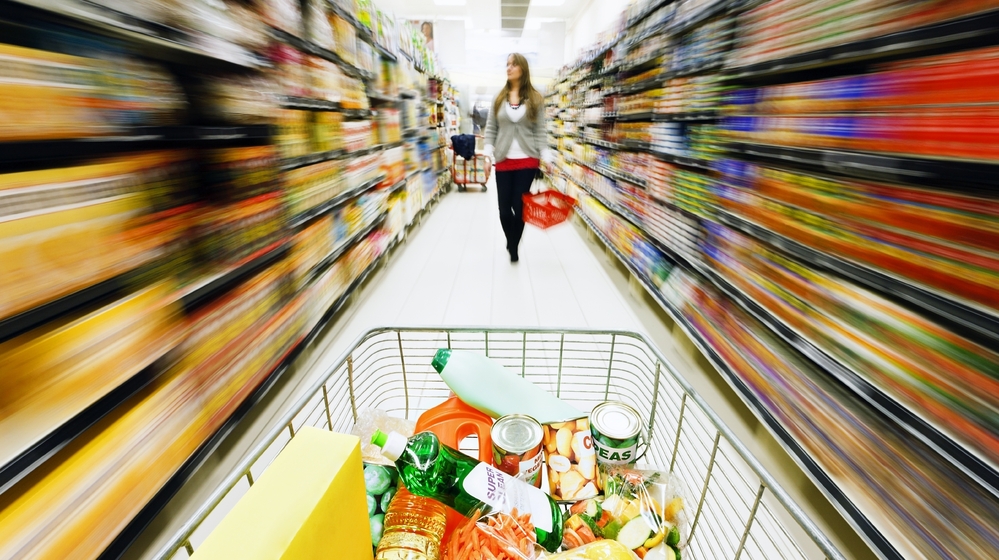 Enlarge image i
Enlarge image i Oxfam's "report card" evaluates giants of the supermarket aisle on their commitment to social and environmental issues.

Oxfam's "report card" evaluates giants of the supermarket aisle on their commitment to social and environmental issues.
Do failing grades inspire more effort? Oxfam hopes so. The activist group on behalf of the poor has just handed out report cards to 10 of the world's top food companies, grading their commitments to protect the environment and treat people fairly.
Oxfam doesn't grade on the curve, evidently. Every company flunked. But two European-based companies, Nestle and Unilever, were at least better than the others.
Both companies have policies that are supposed to ensure that workers around the globe are treated fairly, for instance, and they're better-than-average in trying to limited greenhouse gas emissions. Nestle (Taster's Choice; Perrier) got especially high grades for its efforts to conserve water. Unilever (Lipton Tea; Hellman's mayonnaise) got extra credit for policies aimed at helping small farmers.
Oxfam also assigned grades for how companies protect women's rights, contribute to climate change, and provide information about their suppliers.
Associated British Foods (Mazola corn oil; Twinings Tea) came in at the bottom of Oxfam's rankings, but Kellogg's (Pop Tarts) and General Mills (Cheerios, Yoplait) weren't much better.
These grades, it should be noted, are based on official policies, not actual behavior. Neither Oxfam nor any other independent group has the resources to travel the globe to see first-hand how these policies are implemented on, say, tea plantations in remote corners of Sri Lanka and Mozambique.
Oxfam calls its new campaign "Behind the Brands." This strategy targeting companies that own popular consumer brands is increasingly popular among environmentalists and other groups devoted to social change. Jason Clay, a vice-president of the World Wildlife Fund, laid out the reasons a couple of years ago in a TED talk.
It comes down to what's practical, Clay said. We could try to convince millions of farmers to work differently. We could try to persuade billions of consumers to buy different products. But it's a lot easier for us to put pressure on a few dozen companies huge conglomerates that order commodities from every corner of the globe.
Those companies are extraordinarily sensitive when it comes to the image of their consumer brands. They already have very specific rules for their suppliers when it comes to quality and safety. How about associating those brands with environmental quality and worker well-being?
Oxfam says it will be happy to revise its grades when companies improve their performance.
Opinion Governments have withholding information down to a science Information commissioner asked to decide whether Ottawa broke the law by muzzling its scientists. Bad Rabbit Food: What NOT To Feed Your Bunny - Bunniez on HubPages You'd think that feeding rabbits would be easy. Just chuck any old plant matter into the cage and have done with it, right? Wrong. This feeding methodology happens to ... Health News & Articles Healthy Living - ABC News Get the latest health news from Dr. Richard Besser. Here you'll find stories about new medical research, the latest health care trends and health issues that affect ... Personal Finance - How To Information eHow.com Personal Finance: Find answers to nagging financial questions, from taxes and stocks, to real estate and insurance. Saving money for a new home or your kids ... Cockatiel Cages, Training Advice & Behavior Guide Doctor Cockatiel Discussions about behavior and things you need to know when training a pet Cockatiel. Also read helpful Cockatiel bird cage reviews. CNN Video - Breaking News Videos from CNN.com Pastor uses tithe excuse to refuse tipPastor uses tithe excuse to dispute tip Parenting - How To Information eHow.com Parenting: Parenting tips and advice starting with pregnancy and childbirth, and caring for newborns and toddlers, through dealing with teenagers, and even ... Biochemimbal "PULL DOWN -LENGTHY PAGE" Web est. 8/1998 Web updated 12/5/2011. BAD BEHAVIOR AND "ILLNESS" ARE CAUSED BY. BIOCHEMICAL IMBALANCES. Nutrients such as Vitamins ...
No comments:
Post a Comment